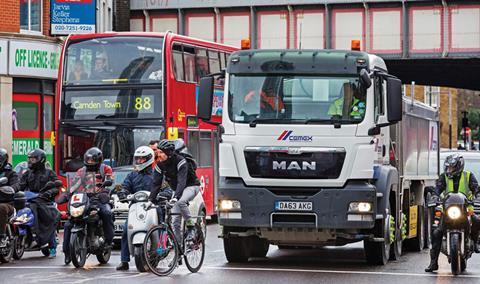
Pay-per-mile charging to use the capital’s roads could ease congestion and drive efficiency for freight operators, according to a new report by think tank Centre for London.
The report, Green Light: next generation road user charging for a healthier, more liveable London, calls for the mayor to adopt a new road user charger scheme that uses a distance-based approach.
Costs for each mile would vary by factor including vehicle emissions and local levels of congestion and pollution, with all prices set before a journey begins.
The scheme, dubbed City Move, would be integrated with London’s wider transport system via a new app and digital platform, which the report proposes would be run by TfL.
It would use real-time traffic data and provide information of the costs and impact of using a particular vehicle compared with an alternative mode of transport.
Freight operators would be able to use a dedicated interface with additional services included, such as booking of loading bays.
Pricing incentives for journeys would be used to discourage empty running, while rewarding operators that choose to use zero-tailpipe emission vehicles, particularly for last-mile deliveries in congested areas.
Firms could also be charged a lower rate for consolidation of loads and retiming of deliveries, which the report said would appeal to freight operators with regular scheduling and volume levels, such as parcels firms and large retailers' distribution operations.
However Centre for London acknowledges this would need to be accompanied by measures to enable consolidation, retiming and use of alternative modes, such as facilitating delivery coordination, reviewing the London Lorry Control Scheme and promoting the use of rail and the river for freight.
Read more:
- Hauliers criticise cost of compliance as London’s Ultra Low Emission Zone goes live
- Euro-6 HGV Road User Levy discount comes into force; fee hike for older trucks
- Cost of clean air zone compliance may see operators abandon clients in affected areas, survey finds
The report warned that existing fees for drivers such as the Ultra Low Emission Zone and Congestion Charge, as well as proposed charging schemes for the new Silvertown and Blackwall tunnels have created “a confusing system for drivers to navigate” as they all apply to different vehicles, geographical areas and operational times.
It therefore urges the mayor and TfL to develop options for smarter road charging with a view to rolling it out by the end of 2024.
Potential for the concept to be used in national CAZs should also be considered.
Silviya Barrett, research manager at Centre for London, said: “The Congestion Charge was pioneering when it was introduced 16 years ago, and the ULEZ is desperately needed to address a growing air quality crisis. But new technologies are rapidly transforming the way people travel – and how they pay for their journeys.
“It is time for London’s approach to road user charging to keep up with the pace of change.
Caroline Pidgeon, Liberal Democrat London Assembly Member, said: “We need a radical overhaul of the growing number of road user charges and instead move to a single comprehensive system that directly tackles congestion and air pollution wherever it occurs in the capital.”














